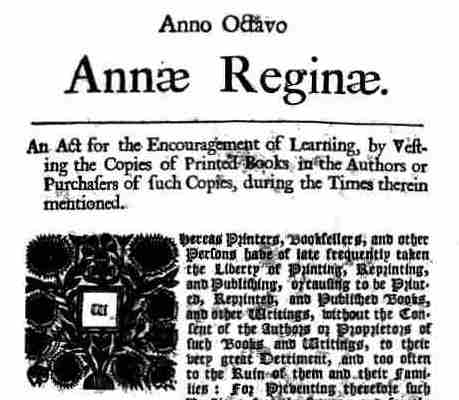Copyright law of the United Kingdom
The origins of copyright law
Copyright law originated in the United Kingdom.
The first copyright act in the world was the British
A full transcript of the
Current copyright legislation
The current legislation is the
The full text for the
International Treaties
The United Kingdom is a contracting party to all major copyright treaties.
It has been a member of the Berne Convention since first version of the Berne Convention treaty was signed on 9 September 1886. It is also a signatory of the
Rights of copyright owners
As with all copyright legislation, UK copyright law aims to promote progress, innovation and artistic endeavours by allowing authors or creators of literary and artistic works to profit from their endeavours by granting them the exclusive right to control that work. To allow this, copyright exists in law as a right that arises whenever an individual or company creates a qualifying work: To qualify for copyright protection a work should be original, exhibit a degree of labour, skill or judgement, and be recorded in some manner (written down, recorded as a sound recording or film, captured as an image, or otherwise fixed in a tangible form).
Please see our copyright basics page for more details on the rights of copyright owners.
Duration
The 1988 Copyright, Designs and Patents Act states when copyright will expire as follows:
- For literary, dramatic, musical or artistic works: 70 years from the end of the calendar year in which the last remaining author of the work dies; or, If the author is unknown, copyright will last for 70 years from end of the calendar year in which the work was created, although if it is made available to the public during that time, (by publication, authorised performance, broadcast, exhibition, etc.), then the duration will be 70 years from the end of the year that the work was first made available.
- Sound Recordings: 50 years from the end of the calendar year in which the work was created, or, if the work is released within that time, 70 years from the end of the calendar year in which the work was first released.
- Films 70 years from the end of the calendar year in which the last principal director, author or composer dies. If the work is of unknown authorship: 70 years from end of the calendar year of creation, or if made available to the public in that time, 70 years from the end of the year the film was first made available.
- Typographical arrangement of published editions: 25 years from the end of the calendar year in which the work was first published.
- Broadcasts and cable programmes: 50 years from the end of the calendar year in which the broadcast was made.
Crown Copyright
Crown copyright will exist in works made by an officer of the Crown, this includes items such as legislation and documents and reports produced by government bodies. Crown Copyright will last for a period of 125 years from the end of the calendar year in which the work was made. If the work was commercially published within 75 years of the end of the calendar year in which it was made, Crown copyright will last for 50 years from the end of the calendar year in which it was published.
Parliamentary Copyright
Parliamentary Copyright will apply to work that is made by or under the direction or control of the House of Commons or the House of Lords and will last until 50 years from the end of the calendar year in which the work was made.
Restricted and allowed acts
The law specifies restricted actions; actions that require the permission of the copyright owner, as well as exceptions that are allowed without permission (this is known as "Fair Dealing").
Actions that are allowed without permission
- Private and research study purposes.
- Educational purposes within an educational establishment (as long as the person doing the copying is giving or receiving tuition).
- Criticism and news reporting.
- Incidental inclusion of something not the subject of the work (example: an item in the background of a photograph).
- Copies and lending by librarians.
- Format shifting or back up of a work you for personal use.
- Caricature, parody or pastiche.
- Actions carried out for the purpose of a royal commission, statutory enquiry, judicial proceeding or parliamentary purpose.
- Recording of broadcasts for the purposes of listening to or viewing at a more convenient time.
- Producing a back up copy of a computer program for personal use.
Actions that require permission
- Copy the work.
- Rent, lend or issue copies of the work to the public.
- Perform, broadcast or show the work in public.
- Adapt the work.
Moral rights
The author of a work, or a director of a film may also have certain moral rights:
- The right to be identified as the author.
- Right to object to derogatory treatment.
